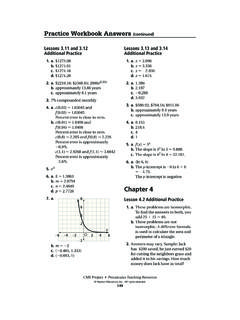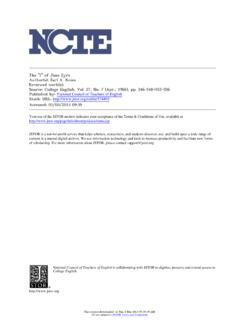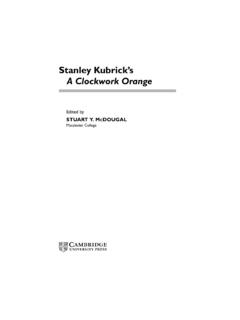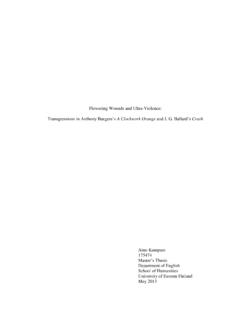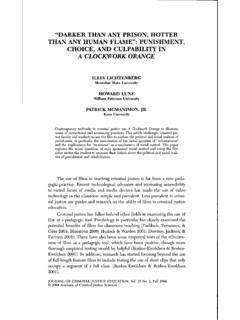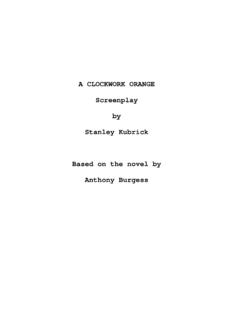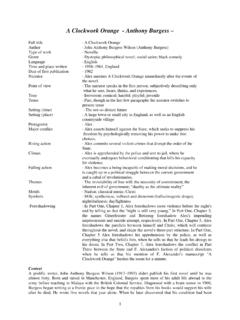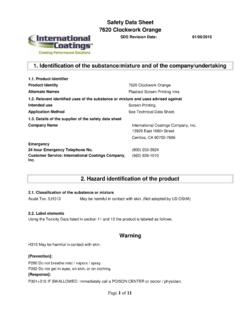Transcription of 'O My Brothers': Reading the Anti-Ethics of the Pseudo ...
1 "O My Brothers": Reading the Anti-Ethics of the Pseudo -Family in Anthony Burgess's "AClockwork orange "Source: College Literature, Vol. 29, No. 2 (Spring, 2002), pp. 19-36 Published by: College LiteratureStable URL: : 23/11/2010 07:30 Your use of the JSTOR archive indicates your acceptance of JSTOR's Terms and Conditions of Use, available JSTOR's Terms and Conditions of Use provides, in part, that unlessyou have obtained prior permission, you may not download an entire issue of a journal or multiple copies of articles, and youmay use content in the JSTOR archive only for your personal, non-commercial contact the publisher regarding any further use of this work. Publisher contact information may be obtained copy of any part of a JSTOR transmission must contain the same copyright notice that appears on the screen or printedpage of such is a not-for-profit service that helps scholars, researchers, and students discover, use, and build upon a wide range ofcontent in a trusted digital archive.
2 We use information technology and tools to increase productivity and facilitate new formsof scholarship. For more information about JSTOR, please contact Literature is collaborating with JSTOR to digitize, preserve and extend access to College "0 my brothers": Reading the Anti-Ethics of the Pseudo -Family in Anthony Burgess's A clockwork orange As novels are about the ways in which human beings behave, they tend to imply a judgment of behavior, which means that the novel is what the sym phony or painting or sculpture is not? namely, a form steeped in morality. Anthony Burgess In 1987, W W. Norton and Company emended the American edition of Anthony Burgess's A clockwork orange (1962) by publishing the novel's missing twenty-first chapter, previously only available in British and other international editions of the book.
3 The introduction of the excised chapter into the American literary and critical mainstream prompted a number of debates regarding the artistic and thematic efficacy of its inclusion in Burgess's narrative. In "A clockwork orange Resucked," his introduction to the unabridged American version of his novel, Burgess summarizes the significance of the Davis is Associate Professor of English at Goshen College and co-editor (with Kenneth Womack) of Mapping the Ethical Turn: A Reader in ethics , Culture, and Literary Theory (2001). Womack is Assistant Professor of English at Penn State University's Altoona College. He the author of Postwar Academic Fiction: Satire, ethics , Community (2001). 20 College Literature (Spring 2002) twenty-first chapter: "Briefly, my young thuggish protagonist grows up," Burgess writes.
4 "He grows bored with violence and recognizes that human energy is better expended on creation than destruction" (1987b, vii). Despite what appears at first glance to be a positive, life-affirming conclusion to Burgess's novel of linguistic terror and "ultra-violence," critics continue to register a variety of different responses to the publication of A clockwork orange in its entirety. Michael Gorra, for instance, argues that the original British version seems "far darker than the glibly apocalyptic American ver sion" (1990, 641). While Deanna Madden recognizes the marked differences between the abridged and unabridged versions of Burgess's text, she dismiss es A clockwork orange ?with or without the twenty-first chapter?
5 As a con tinuation of the protagonist's misogyny in "true patriarchal fashion" (1992, 306). Finally, John J. Stinson calls the excised chapter "problematic," con tending that "the truncated ending, which leaves the reader with a stark pres entation of unregenerate evil, surely carries more impact" (1991, 59). Yet each critic neglects to consider the tremendous ethical import of A clockwork orange 's twenty-first chapter as a rejoinder to the vacuous moral and family systems that fail Alex, Burgess's teen-aged protagonist, as he attempts to achieve selfhood. In spite of what appear to be Alex's obvious attempts to establish and participate in various family structures throughout the novel?indeed, to search for some form of "HOME"?
6 Critics continue to ignore the role of the family as a substantial narrative force in Burgess's text. An interdisciplinary Reading of A clockwork orange using recent insights in ethical criticism and family systems psychotherapy demonstrates not only the necessity of the twenty-first chapter as the fruition of Burgess's moral vision, but also the centrality of family structures as catalysts for interperson al development and as ethical foundations for individual change. In Love's Knowledge: Essays on Philosophy and Literature, Martha C. Nussbaum illustrates the nature of ethical criticism's recent emergence as a viable interpretive par adigm: "Questions about justice, about well-being and social distribution, about moral realism and relativism, about the nature of rationality, about the concept of the person, about the emotions and desires, about the role of luck in human life?
7 All these and others are debated from many sides with con siderable excitement and even urgency" (1990,169-70). In addition to func tioning as a self-reflexive means for critics to explain the contradictory emotions and problematic moral stances that often mask literary characters, ethical criticism provides its practitioners with the capacity for positing socially relevant interpretations by celebrating the Aristotelian qualities of living well and flourishing. In this way, ethical criticism evokes the particu larly "human character" of literature that Tobin Siebers praises in The ethics of Criticism (1988, 10).x Todd F. Davis and Kenneth Womack 21 The contemporary practice of ethical criticism finds its origins in the reader-response theories of Louise M.
8 Rosenblatt, as well as in the moral phi losophy of such thinkers as Nussbaum and Bernard Williams. In The Reader, the Text, the Poem: The Transactional Theory of the Literary Work, Rosenblatt devotes particular attention to the notion of "efferent" Reading , an interpre tive methodology in which readers primarily interest themselves in what will be derived materially from the Reading experience (1978, 23-25). According to Rosenblatt, efferent readers reflect upon the verbal symbols in literature, "what the symbols designate, what they may be contributing to the end result that [the reader] seeks?the information, the concepts, the guides to action, that will be left with [the reader] when the Reading is over" (27).
9 The reflective nature of efferent Reading underscores the interpretive power of ethical criticism as a means of literary critique, especially as a tool for address ing the moral and interpersonal qualities in novels such as A clockwork orange that consider a host of dystopian and ethical imperatives. Moral phi losophy often provides ethical critics with intellectual insight into the most vexing issues inherent in human experience, moreover, from the nature of selfhood and love to the often divergent qualities of goodness, evil, and commitment. As Williams notes in ethics and the Limits of Philosophy," Critical reflection should seek for as much shared understanding as it can find on any issue, and use any ethical material that, in the context of the reflective dis cussion, makes some sense and commands some loyalty.
10 The only serious enterprise is living," Williams adds, "and we have to live after the reflection" (1985,117). A neo-humanist criticism in its own right, family systems psychothera py provides readers with a powerful mechanism for reflecting upon the role of the family in literary texts. Its theoretical rapport with ethical criticism finds its origins, moreover, in each paradigm's valuation of the significant interrelationships that inevitably exist between our senses of selfhood and the larger worlds in which we live. In The Theory and Technique of Family Therapy, Charles P. Barnard and Ramon Garrido Corrales observe that "the members of one's family are one's significant others par excellence" (1979, 9). As an inherently open system, the family must at once provide support for inte gration into a solid family unit as well as differentiation into relatively autonomous selves.

